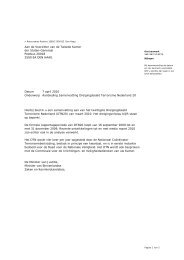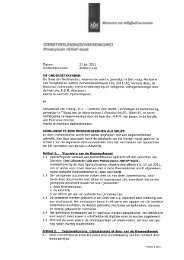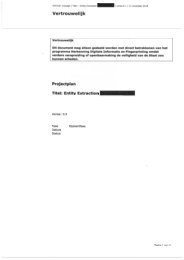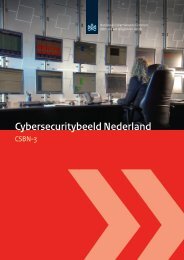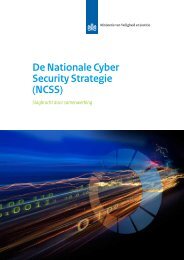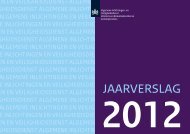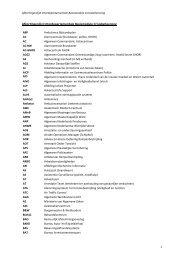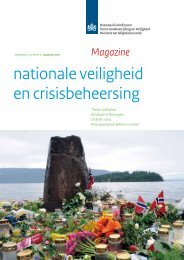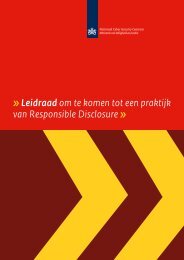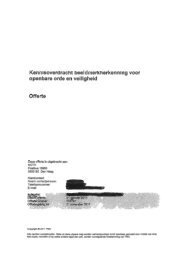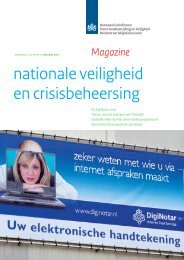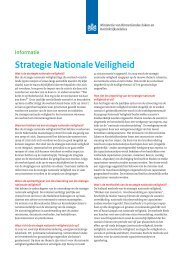third Cyber Security Assessment Netherlands - NCSC
third Cyber Security Assessment Netherlands - NCSC
third Cyber Security Assessment Netherlands - NCSC
You also want an ePaper? Increase the reach of your titles
YUMPU automatically turns print PDFs into web optimized ePapers that Google loves.
Furthermore, business information can be placed online in unknown<br />
environments (cloud) whose security is unknown and is possibly<br />
insufficient. This results in the risk of data leaking. Consumerisation<br />
thus yields vulnerabilities but it still cannot be said that the number<br />
of incidents attributable directly to consumerisation is increasing<br />
sharply or is large.<br />
4.1.3 Insufficient insight into threats and incidents<br />
<strong>Cyber</strong> security demands an up-to-date and broad view of new<br />
developments, vulnerabilities, methods of attack and defence<br />
mechanisms. For organisations, this demands insight into the<br />
in-house IT environment such that attacks on or penetrations into<br />
this environment are detected quickly. In addition to insight and<br />
detection, cyber security also requires the capacity to respond<br />
rapidly and appropriately to threats and incidents: effective cyber<br />
security also requires an ability to act. After all, real life shows that<br />
incidents can never be fully avoided and it is therefore important<br />
to be well prepared.<br />
Currently, many organisations still lack the right knowledge,<br />
detection methods and the capacity to deal with incidents.<br />
Incidents such as the Pobelka botnet demonstrate that the network<br />
has been penetrated in many organisations and computers have<br />
been infected, but that this often goes unnoticed for many months.<br />
In many cases, organisations focus their information security on<br />
standards such as ISO2700x, but this results in information security<br />
being set up in a relatively static way. The modern threats requires<br />
them to get up to speed with their insight and ability to act. [58]<br />
4.1.4 Efficiency and customer satisfaction putting privacy under pressure<br />
In its review of 2012, the Dutch Data Protection Authority (CBP)<br />
noted that the government is increasingly collecting and linking<br />
personal details. [2: CBP 2013] Given that in many cases citizens are<br />
obliged to hand over personal details, it is essential that citizens can<br />
be confident that these details are handled carefully, in accordance<br />
with the law. However according to the CBP, the government –<br />
spurred on by technological developments and the desire to be<br />
efficient and achieve customer satisfaction – is increasingly linking<br />
personal data to then use this data for completely different<br />
purposes than those for which it was originally intended. Indeed<br />
the same can be said of companies that acquire and store customer<br />
data on a large scale.<br />
4.1.5 Vulnerability when using cloud services<br />
Cloud computing has advantages but it also entails risks, in part<br />
because access is not always effectively secured and cloud providers<br />
assume rights for use of the data under constantly changing terms<br />
and conditions. American and European privacy laws are not<br />
aligned with each other, but the EU considers American cloud<br />
service providers to be sufficiently secure provided they are deemed<br />
to be a ‘safe harbour’ and have certification.<br />
Customers could nevertheless become involved with foreign<br />
regulations that may be in conflict with the interests that are<br />
to be protected (and possibly local regulations), such as the privacy<br />
of customers/patients/citizens, intellectual property and continuity<br />
of business operations. With the Patriot Act as a symbol, the issue<br />
is increasingly attracting the attention of politics and science and of<br />
organisations considering acquiring an (American) cloud service.<br />
Many countries have legislation that is comparable to the Patriot<br />
Act and the powers arising from it may not be superseded by<br />
contractual guarantees or Dutch legislation. According to research<br />
carried out by the University of Amsterdam, the transition to cloud<br />
services will lead to a reduction in the autonomy of organisations<br />
[53: UvA 2012]<br />
when dealing with enquiries from foreign governments.<br />
It is known that cloud services are used to store and exchange<br />
illegal material and to carry out botnet attacks. [59]<br />
Cloud computing also presents challenges for the detection and<br />
[57: WODC 2012]<br />
prosecution of crime.<br />
4.1.6 Social media remain an unintentional source of information<br />
Social media are of great interest to individuals with malicious<br />
intent because of the personal information available there, the<br />
mutual trust between the participants of a social network and the<br />
Protection of medical data<br />
In 2012, research commissioned by the CBP revealed that a large<br />
number of the hospitals had not implemented sufficient safety<br />
measures to eliminate vulnerabilities with respect to the<br />
confidentiality, integrity and availability of patient and medical<br />
data. In September 2012, for example, it reprimanded a<br />
hospital [58] and tasked it with making improvements after audits<br />
revealed that identification, authentication and authorisation<br />
were insufficiently managed for systems with digitalised patient<br />
files. This gave employees greater access to the data than their<br />
role should have warranted.<br />
According to the Special Interest Group Information <strong>Security</strong> in<br />
University Hospitals, a number of patient-side developments<br />
support the flexibility and efficiency of personal care provision,<br />
but on the other hand there are again risks of undesirable and<br />
unintentional access to medical data. Apps are available where<br />
patients can enter their personal and medical data and share<br />
these with a care provider. However these apps are provided by<br />
<strong>third</strong> parties and it remains unclear where the data is stored and<br />
what security system is applied to these data.<br />
58 www.cbpweb.nl/pages/med_20120920-beveiliging-medische-gegevens-rpz-ziekenhuis.aspx<br />
59 http://news.cnet.com/8301-1009_3-10413951-83.html<br />
32



